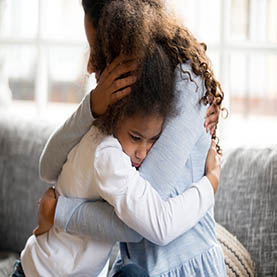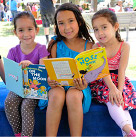The most recent tragedy in Saugus, Santa Clarita was very close to home and has left us devastated and at a loss for words. After a very traumatic event, it is normal for parents to struggle with what they should say and share with their children. Our Family Well Being Department put together some helpful tips for parents to help their children in the immediate aftermath of a traumatic event.
The American Academy of Pediatrics (AAP) encourages parents, teachers, child care providers, and others who work closely with children to filter information about the crisis and present it in a way that their child can accommodate, adjust to, and cope with.
1. The best thing parents can do is to be there for their kids. Encourage kids to talk about what’s going on emotionally for them. Be aware that some kids may want to talk a lot about the tragedy. Some may take a little longer to open up. Some may avoid talking about it at all. Don’t push them to talk. For those kids, just let them know you are available when and if they do want to talk. If you talk with them about the event, hear them out first before offering your opinions or solutions. It’s important to give them space to think and talk over their thoughts and feelings before providing your own.
2. Understand that the entire range of emotions is completely normal. No two people grieve or process events in the same manner or in the same time frame. Some kids may be openly emotional (crying, angry, etc.) while others may be more reserved/unemotional. Both are normal.
3. Be aware that some kids, even older ones, may exhibit behaviors that we typically expect from younger children…clinginess, fearfulness, difficulty sleeping, eating changes, wanting to sleep with the lights on, wanting to sleep near their parents, not wanting to be alone, etc. It’s normal for a period of time after any traumatic event.
4. For all kids, keeping to your typical routine as much possible is important. It helps provide a sense of normalcy in the chaos immediately following a traumatic event.
5. For older kiddos, re-establishing a sense of control will be important. Look for opportunities and encourage them to participate in conversations about how to make their schools safer and what they need and want from adults. The schools may start to hold these types of meetings. Parents can also participate with their kids to show support.
6. In the age of social media, it may be difficult to limit the amount of TV/media coverage of the tragedy for older kids. For younger children, it will be important to limit the amount of exposure to media stories/videos about the event. Excessive media consumption about the event can contribute to an even greater sense of feeling unsafe in younger children.
7. In the weeks and months following the event, establish a time to talk to your kids at least once a week where everyone unplugs…no TV, no phones, computers, games etc. This helps reconnect and reassures your kids that you continue to be there for them.
8. Parents need to take care of themselves…talk about your fears and anxieties with your own support system so that you can be there for your kids.
9. Watch for signs of depression/anxiety and seek immediate professional help for any child who exhibits thoughts/signs of wanting to hurt themselves or someone else. Call 911 if necessary.
10. Be patient. Things may never return to the “normal” you and your child(ren) knew before the trauma, depending on how closely linked to the tragedy they were. However, there will be a “new normal” established in time.


